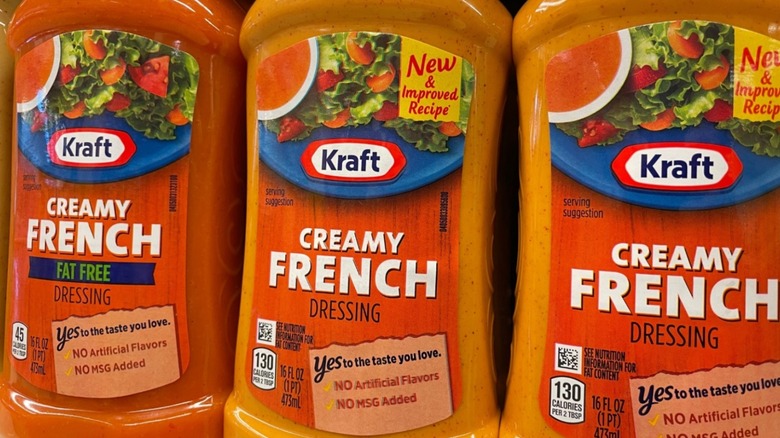Why The FDA Just Changed Its Definition Of French Dressing
The U.S. Food and Drug Administration has declared that they will revoke the standard of identity for French dressing, effectively deregulating it. As The Wall Street Journal explains, this means that the FDA will no longer enforce a strict standard of what French dressing is, or the ingredients that it can contain.
As detailed in the Federal Register, the decision comes from a change in public perception. When they codified a definition for French dressing in 1950, it was decided that a French dressing needed 35% vegetable oil, vinegar or lemon juice, and a seasoning ingredient. "Tomatoes or tomato-derived ingredients were among the seasoning ingredients permitted, but not required," the Federal Register notes.
The code was revised again in 1977, stating that the dressing can have salt, tomato paste, tomato puree, and ketchup or sherry wine in it, but it doesn't have (WSB-TV). This definition set by the FDA is a broad generalization that might lead to confusion, considering it says all of the ingredients the dressing should contain, yet no clear standard for the recipe.
French dressing will still be available
There's no need to worry, as the deregulation of French dressing is not going to actually affect your favorite salad topper, although it will no longer be required to be made using 35% vegetable oil (per The Washington Post). Really, the biggest change is revoking what the standard of identity means for the dressing.
The statement in the Federal Register determines that the coding for the dressing "no longer promotes honesty and fair dealing in the interest of consumers." Food Timeline charts the emergence of French dressing in Anglo-American cuisine, reporting that the term first appears at the end of the 19th century as another word for vinaigrette, and really, there's no specific French origin to the dressing.
With the dressing deregulated, companies are now free to create new recipes of what "French" can mean, perhaps adding olive oil and more tomato paste. For those who love this salad dressing, the possibilities are exciting but don't worry if you're a fan of the standard flavor you're used to. The FDA explains that "Food products with the name French dressing will continue to be available to consumers," (via Wall Street Journal).

